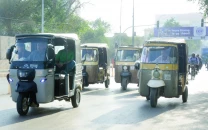Giving justice a hand

After only a few days of his arrest and subsequent confession, the man was killed by friendly fire.
His accomplices, who had apparently come to free him, were reportedly firing at the police when their bullets hit him and he died. Add to that rather clichéd account the confession of a police official earlier that there was great pressure on the police to kill the man - who had not yet been convicted by a court - in a staged encounter and you have a repetition of a well-known pattern.
The “era of extra-judicial killings” appears to be back, as was also pointed out by Chaudhry Zaheeruddin during Punjab Assembly’s last session. It is hardly a surprise, considering that Shahbaz Sharif’s previous stint also featured extra judicial killings.
During his two years in government then (1997-1999), there were 850 killings categorised as ‘extra-judicial killings’ by the human rights organisations.
Some might want to justify these killings as a way of making up for the sluggish judicial system or the weaknesses of the police, but they miss the bigger picture. For one, ‘encounters’ have not been shown to work as an effective deterrence measure. For another, the action is unlawful. The premise of criminal justice system is based around the concept of innocence. One of the basic tenets of criminal law is that justice should be administered in a ‘safe’ manner; it believes that the cost a society might pay for letting go a criminal is much less than the cost of an innocent convicted falsely.
Tolerating such acts allows that the police to arrogate to themselves the role of the judiciary, some thing that needs to be discouraged. Most importantly condoning such acts means that a society has no respect for human rights. In addition to our own Constitution, all international treaties, including the Universal Declaration of Human Rights and the International Covenant on Civil and Political Rights, affirm a person’s right to life and security. The latter’s Article 6 states, “No one shall be arbitrarily deprived of his life.” Article 4 protects this right even in times of emergencies.
The severity of the problem and its systemic nature must be addressed at all levels. In order to stop the continuing abuse of a basic right, the government must stop meting out their version of speedy justice. Instead, it should address the problems and shortcomings in the justice system. Procedural loopholes in police practices need to be plugged so that those who are guilty do not get released.
Though speedy justice is a noble ideal, handing it out at police’s discretion defeats the whole purpose of a justice system, no matter how inefficient.
Published in The Express Tribune, July 15th, 2010.



















COMMENTS
Comments are moderated and generally will be posted if they are on-topic and not abusive.
For more information, please see our Comments FAQ